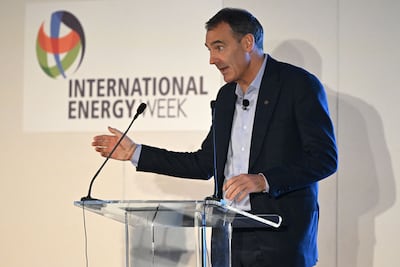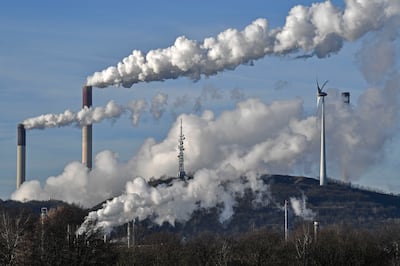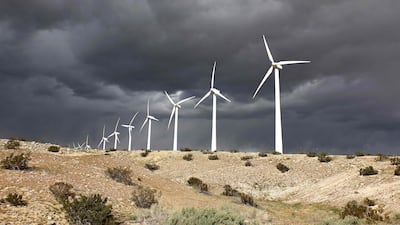Transition is the buzz word at this year's International Energy Week in London. Indeed, the conference itself has undergone a change — only a few years ago, it was called International Petroleum Week.
Low-carbon production, renewables and net-zero are now at the forefront of this gathering of some of the biggest figures in the global energy sector.
Juliet Davenport, the president of the Energy Institute, told the conference that 65 million people now work in the global energy sector, which amounts to about 2 per cent of the world's total workforce. And half of those 65 million work in clean energy.
British MP and chairman of the UK's Net Zero Review, Chris Skidmore, said that 90 per cent of the world's GDP was now under some sort of net zero target.
“We need to provide long-term stability to achieve net zero,” he said.
Mr Skidmore added that the UK requires a more comprehensive net zero strategy and that it needs to “move away from the project-by-project approach”.
BP's chief executive, Bernard Looney, said: “Three years ago, people wanted lower carbon.
“Now, they want an energy system that works — that provides affordable, stable and lower carbon energy.”
Orderly transition
Transition is an important process for BP. Under Mr Looney's watch, it became the largest energy company of its kind to pledge net zero.

Three years ago, BP started its own process of transitioning from being an international oil company to emerging as an integrated energy firm.
Mr Looney also pointed out that because energy is the “lifeblood of society”, transition needs to be “orderly”.
“And orderly is not another word for 'slow'", he added.
Orderly for Mr Looney means providing lower carbon emissions energy that's both affordable and secure. And that means investing into both the current energy system and the transition.
BP is investing $8 billion into lower the carbon emissions of its oil and gas products and operations as well as putting $8 billion into its transition business, which include biofuels, wind and solar projects, as well as hydrogen production facilities and EV charging infrastructure.
“We will have new arms to our company,” Mr Looney said.
“We will still have oil and gas, but we will also be big in biofuels, big in wind generation, big in hydrogen.”
"We need 'and' not 'or'," he added.

It a sentiment that's echoed among the other delegates from big oil companies to green energy technology start-ups.
Ibrahim Al Zubi, senior vice president, Sustainability and Climate at Abu Dhabi National Oil Company, said there was need to "recognise that we must continue to supply oil and gas, while decarbonising and investing in transition".
“We need to ensure we maximise our energy with the lowest possible emissions – maximising economic impact, minimising environmental impact," he added.
Grete Tveit, from the Norwegian energy company, Equinor, said: “We do believe that the world will still need fossil fuels in 2050, but they’ll need to be produced with the lowest carbon emissions possible.”
That's what's called the transition trilemma. Introducing low or no carbon-emitting energy supplies, while phasing out fossil fuels and maintaining reasonable pricing and ensuring energy supply.
Capital expenditure
In the near future, half of BP's capital expenditure will go into transitional growth. That trend is already well under way. In the past three years, capital investment in net zero has gone from 3 per cent to 30 per cent of total capital expenditure. In two years, it's expected to be 40 per cent. By 2030, it could hit 50 per cent.
Nonetheless, Mr Looney did say that BP is realistic and its management essentially has three tasks.
Firstly, to invest cash flows. Secondly to pay taxes and thirdly to return value to shareholders. The investment into its transition is growing, the $15 billion in taxes it paid last year were the highest the company has ever paid and it is increasing its share dividend by 10 per cent.
“At the end of the day, we have to boil down everything we do into these three things,” he said.
Mr Looney added that BP is in an “extraordinary period of change” and that “net zero is a massive opportunity for companies like ours”.
But for all the talk of opportunity and positivity, there were some who raised the point that while progress is being made on reducing carbon emissions is some areas, overall the path to net zero has, so far, been painfully slow.
“We need to speak truth to power – we are off target and almost certainly will be for some time to come," said Dr James Henderson from the Oxford Institute for Energy Studies.
“The transition is going to be volatile – we saw that reflected in Cop27.”
“We need to reduce carbon emissions by 48 per cent by 2030 to be on target. At the moment we’re reducing by zero.”
“If we hit 2030 and we’re still not on target, we are looking at a situation where companies could have policies imposed on them.”


